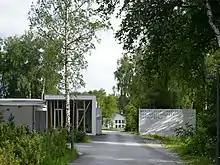Max Planck Institute for Ornithology
The Max Planck Institute for Ornithology is a non-university research institution under the sponsorship of the Max Planck Society for the Advancement of Science (MPG). It is located in Seewiesen, which belongs to the municipality of Pöcking in Upper Bavaria. The institute’s focus lies on basic scientific research in the fields of organismic biology, zoology, ornithology, neurobiology, behavioural ecology, evolutionary biology and evolutionary genetics. The institute is managed on a collegial basis, i.e. one of the two directors of the institute takes over the management for a certain time period. Since January 2020, the managing director is Bart Kempenaers.[1]
 | |
| Location |
|
|---|---|
| Fields | organismic biology, zoology, ornithology, neurobiology, behavioural ecology, evolutionary biology, evolutionary genetics |
Parent organization | Max Planck Society |
Staff | 150 |
| Website | Max Planck Institute for Ornithology |
History
The Max Planck Institute for Behavioural Physiology was inaugurated in Seewiesen in 1958 under the direction of Erich von Holst and the later Nobel Prize winner Konrad Lorenz. In 1959, the Ornithological station in Radolfzell was attached to the MPI for Behavioral Physiology. Up to this day, the coordination of Bird ringing for South Germany, Austria and Berlin happens in Radolfzell.[2]
The history of the ornithological station in Radolfzell reaches back to the former Rossitten Bird Observatory, which was founded by the German Ornithological Society under Johannes Thienemann in 1901 in what was then East Prussia (today the Rybatschi Bird Observatory). In 1924, the Rossitten Bird Observatory was integrated into the Kaiser Wilhelm Society, moved to Radolfzell in 1946 and incorporated into the Max Planck Society in 1949.[2]
In 1999, the Max Planck Institute for Behavioural Physiology closed down and became the research unit for Ornithology of the Max Planck Society by making the departments of Eberhard Gwinner (Andechs) and Peter Berthold at the ornithological station in Radolfzell independent. In 2004, the research unit turned into the Max Planck Institute for Ornithology.[2]
Until June 2019, the Max Planck Institute for Ornithology had a branch in Radolfzell on Lake Constance and in Constance, with the directors Martin Wikelski and Iain Couzin. They are now the independent Max Planck Institute for Behavioural Biology.[2]
The structure of the institute
The institute consists of two departments, seven research groups and two working groups.[3]
- Department of Behavioural Neurobiology, Manfred Gahr
- Department of Behavioural Ecology and Evolutionary Genetics, Bart Kempenaers
- Research Group Evolution of Sensory Systems, Maude Baldwin
- Research Group Communication and Social Behaviour, Henrik Brumm
- Research Group Acoustic and Functional Ecology, Holger Goerlitz
- Research Group Evolutionary Physiology, Michaela Hau
- Research Group Behavioural Genetics and Evolutionary Ecology, Clemens Küpper
- Research Group Avian Sleep, Niels Rattenborg
- Research Group Neural Circuits for Vocal Communication, Daniela Vallentin
- Working Group Comparative Cognition, Auguste von Bayern
- Working Group Pablo Oteiza
Wind tunnel for research on bird migration
Since 1999, the MPI for Ornithology possesses a wind tunnel in Seewiesen. It has been especially designed for the investigation of aerodynamic aspects and allows the researchers to observe and record animals in flight in a flying section. At the beginning, the main research focus was on metabolic questions (heart rates, wing beat frequencies, water balance, fat metabolism etc.). However, the construction of the tunnel allows for many other studies in diverse fields of interests. The wind tunnel can be used by external researchers. It is the worldwide second tunnel built for flight simulation with birds.
International Max Planck Research School for Organismal Biology
Since 2009, the doctoral education at the Max Planck Institute for Ornithology takes place at the International Max Planck Research School for Organismal Biology (short: IMPRS for Organismal Biology). It is a structured educational programme, organized in cooperation with the Max Planck Institute for Behavioural Biology in Radolfzell and Constance and the Faculty of Biology at the University of Constance.[4]
References
- "Prof. Dr. Bart Kempenaers".
- Kaiser-Wilhelm-/Max-Planck-Institut für Ornithologie, in: Eckart Henning, Marion Kazemi: Handbuch zur Institutsgeschichte der Kaiser-Wilhelm-/ Max-Planck-Gesellschaft zur Förderung der Wissenschaften 1911–2011 – Daten und Quellen, Berlin 2016, 2 volumes, volume 1: Institute und Forschungsstellen A–L (online, PDF, 75 MB), pages 668–671; volume 2: Institute und Forschungsstellen M–Z (online, PDF, 75 MB), pages 227–234; 686–702; 741–749.
- "Research at the Max Planck Institute for Ornithology". Max Planck Institute for Ornithology.
- Forschungsbündnis der organismischen Biologie. Website des Informationsdiensts Wissenschaft.